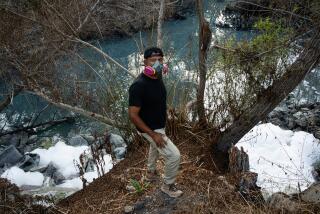Pipe Grease Cited in Sewage Spills
The leading cause of the sewage spills that have plagued Orange County recently is grease and oil buildup in sewer pipes from restaurants and high-density residential areas, the grand jury reported Wednesday.
Although sewage spills do not always result in beach closures, almost all of the closures are the result of contamination from sewage spills into drains or waterways that flow into the ocean, the report stated.
According to the grand jury, between 1987 and 2000 the county’s Health Care Agency issued 252 orders that closed beaches for more than 2,000 days, “and the situation is getting worse.”
The report--”Sewage Spills, Beach Closures: Trouble in Paradise?”--recommended three steps to reduce grease buildup in the sewers:
* Adopt a countywide grease discharge ordinance with enforcement power among cities and waste-water collection and treatment agencies.
* Start an aggressive public education program aimed at restaurant owners and employees as well as the public, including owners and managers of large housing complexes.
* Seek a regular review of restaurant grease trap and interceptor maintenance logs by the Orange County Health Care Agency and routine inspection of the devices.
The study found that although most cities and agencies have a grease discharge ordinance, relatively few have a regular inspection and enforcement program. Nine of the cities or agencies that said grease was a major cause of sewage spills require grease traps or interceptors, the report stated.
Howard Sutter, a spokesman for the Orange County Health Care Agency, which inspects restaurants and markets for health and safety code compliance, said: “We are prepared to add the inspection and monitoring of maintenance logs to our regularly scheduled restaurant inspection program, and we have already started the process of determining how best we can accomplish that.”
Supervisor Tom Wilson, whose district includes much of the county’s coast, welcomed the report.
“We here in Orange County must address issues like this. We must adopt ordinances and implement enforcement if we’re going to demonstrate to our residents and businesses that we’re truly serious about clean water and keeping our beaches open.”
Wilson said he will ask the Board of Supervisors to adopt the measures recommended.
Orange County has more than 6,800 restaurants and about 12,000 miles of sewer pipes, the report stated, so if grease-related sewage spills are to be prevented, more effective methods of minimizing grease discharge must be developed.
The grand jury report corroborates an investigation by the Los Angeles Times in August 2000 which found that while some of the sewage spills that year were caused by an aging sewer system, most were caused by easily prevented situations like pipes choked with grease.
Grand juror Fred Beams said that when the panel convened last July, “you couldn’t pick up a newspaper without reading about a beach closure in Orange County, so we decided to take a look at it.”
The jury conducted a survey of 35 waste-water collection and treatment agencies in the county and some outside the county.
The jurors spent about five months researching the report, visiting restaurants and housing complexes and speaking with owners and managers. They also inspected grease traps and interceptors.
More to Read
Sign up for Essential California
The most important California stories and recommendations in your inbox every morning.
You may occasionally receive promotional content from the Los Angeles Times.










